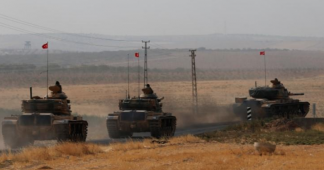By Onur Sinan Güzaltan
02/29/2020
he II.Siege of Vienna in 1683, was the peak reached by the Ottoman Empire and also was the beginning of the four-centuries long of retreat on the European lands.
Battle of Stalingrad, which lasted from 1942 to 1943, was the Germans’ farthest point to conquer, also the point that the war began to turn against the Nazis.
The collapse of the Soviets, is associated with the fall of the Berlin wall in 1989.
We can add on the list many pages…
HISTORY THAT IS BEING WRITTEN IN IDLIB
Idlib is the candidate to be on the pages of history, as the city where the Turkish politics of balance between the United States and Russia have collapsed, which has been disrupted by some interruptions since the World War II, and has been heavily played out especially for the past 5 years.
Turkey, which was bonded to the Atlantic via NATO in 1952, either did not or could not show the will to leave this camp completely, even though it has occasionally made moves to improve relations with the Soviets, in times of crossing of the line by the Atlantic, during the era of Menderes, Demirel or Ecevit.
The current government in Turkey, has taken such a clear opposing position against the Atlantic Alliance, for the first time in the history of the Turkish Republic since 1938, during the Atlantic-backed July 15th 2016 coup attempt. During this period, the policies of deepening the relations with Eurasian and East Asian countries, and especially with Russia, were implemented.
The Astana Process, purchase of the S-400 Air Defense Systems, the Akkuyu Nuclear Power Plant, the actions taken to pierce the embargo against Iran, the TurkStream Project and the will to take part in the Belt and Road Initiative, were the concrete steps of this new tendency.
The military and judicial struggle against the PKK/YPG, which overflowed into the north of Syria and FETO at the homeland, were areas where Turkey openly clashed with the Atlantic and its contractors.
The anti-US/European imperialism forces in Turkey, have considered these steps as being taken towards an independent Turkey and they supported it.
THE CONCESSIONIST FOREIGN POLICY TRADITION
But the government, continues the policy that puts Washington and Moscow in a balance, and presents it as an “independent foreign policy,” just as the practice of Idlib has once again shows us.
The foreign policy, bearing the traces of the political route left from the Ahmet Davutoglu era, is still stuck on Idlib today.
What is stuck in essence, is the tradition of concessionist foreign policy, which is trying to maintain the “balance” by staying in the Atlantic.
Although this tradition sometimes tends to stand against the Atlantic, as in the case of the Cyprus Campaign, it is mainly in favor of a Turkey located on the axis of NATO and the West.
Today, even among the opposition, the most common tendency in the foreign policy is a “Turkey within the Western alliance”.
These circles do not criticize Davutoglu’s commitment to NATO, but towards his compromises that were more than the necessary on the national interests, to keep the balance with NATO.
In summary, the tradition of foreign policy on which the government and the opposition relied on, does not have a fundamental problem with the Atlantic or NATO.
STATEMENTS OF HULUSI AKAR
Minister of the National Defense Hulusi Akar, has defended the political axis from the TV on February 20th, which has revealed the small area of which the politics of balance is stuck in Idlib.
In the same sentence, Akar had to show signs of cooperation with both Moscow and Washington, showing much of an insolubility rather than balance by doing so.
Putting Patriots upfront to the S-400s, trying to balance the Russians’ military and political thrust by calling NATO to the region, calling Putin for every action Trump has taken and sending a message to the world, are not sustainable politics.
The politics of balance has collapsed in Idlib, and the axis that Turkey had been following as its foreign policy for 60 years, has come to a crossroad.
The new diplomatic desks that are to be established, could delay this choice for a few months at most. The choice has become obligatory.
“DECISIVE MOMENTS IN HISTORY”
At the beginning of our article, we gave examples of some historical breaking points.
In his book Decisive moments in History, Stefan Zweig describes the breaking points through the “moments” of the leaders, who had made the humanity leap ahead the stairs of history.
Zweig sums up “those moments and individuals” with these words; It is found very rarely in the life of individuals and in the course of history, the tragic and fate-determining moments of which a decision that transcends ages, is squeezed into a single calendar, a single hour, and often just in one minute. I call these moments the Moment when the Star of Humanity Shines; Because they shed light on the darkness of the past constantly, just like the stars. Because history does not need helping hands in such unique moments, when it reaches the perfection.
In his book, Zweig also included the revolutionary policies of Mehmed II. who has led the Conquest of Istanbul and has started a new age in the history.
Today, many politicians are counting the license plates of the provinces of Idlib or Mosul as a part of Turkish territory, thus claiming that they are following the path of Mehmed II. and playing the game of conquest.
But the same politicians, feel no shame to call on the United States for help, when they are stuck in this game of conquest.
The situation is tragicomic.
A repetition of Abdulhamid II.’s failed politics of balance, cannot be the cure for Turkey’s wounds. The cure is in the revolutionary policies, that can achieve the impossible by carrying the ships off the land, and being able open a new path.
Today’s Mehmed the Conquerors, are not the ones that are hostile to its neighbors through the politics of balance between the United States and Russia, but the ones who seeks cooperation with the neighbors for the path of an independent foreign policy, those who stand against the American Empire and those who struggle to throw it in the garbage can of the history, just like the Byzantine Empire.
* Onur Sinan Güzaltan, Political expert, geopolitical analyst, journalist (Turkey)
Published at https://uwidata.com/8353-idlib-collapse-of-the-politics-of-balance/
Also read
Deadly Clashes in Syria’s Idlib Show Limits of Turkey’s Options











